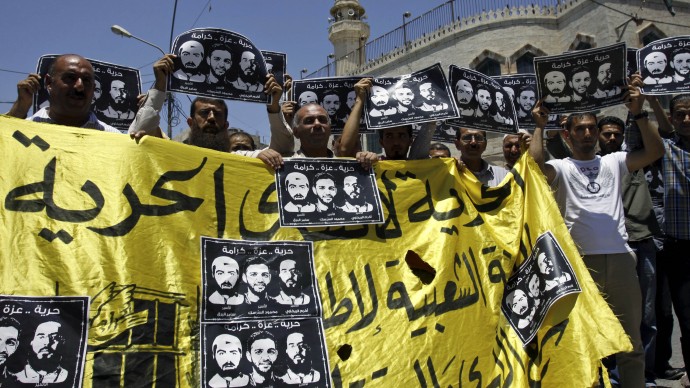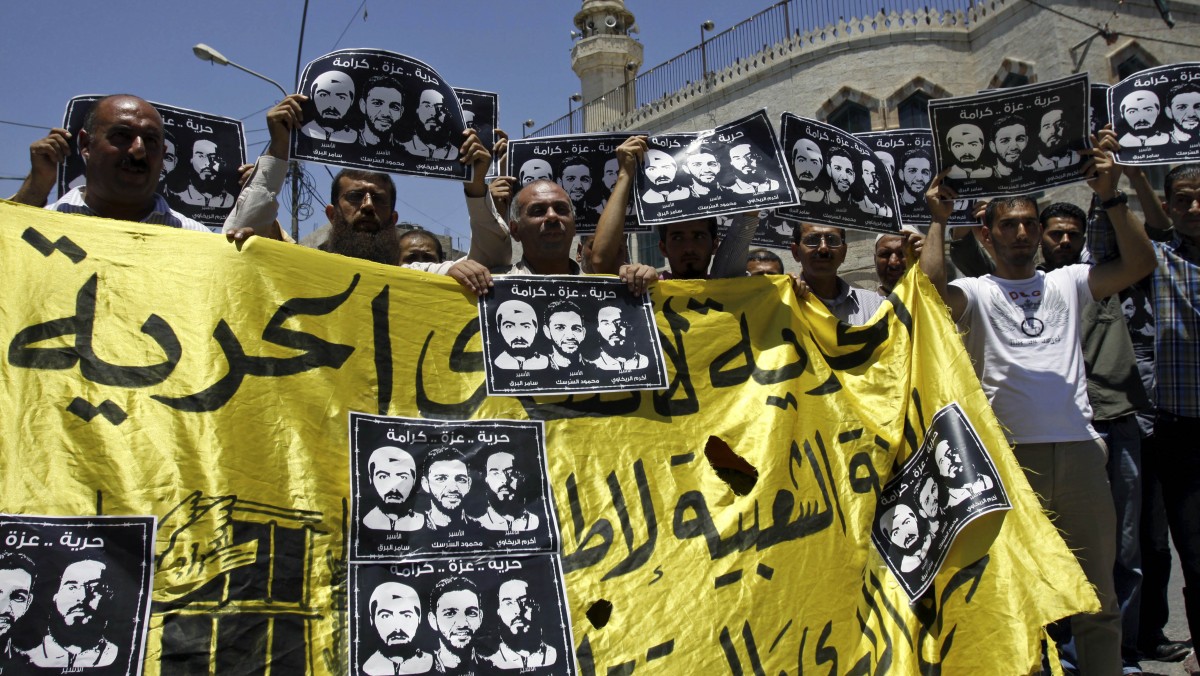
(NAMIBIA) MintPress — Palestinian hunger striker Akram Rikhawi has ended his 102-day hunger strike after reaching an agreement with the Israeli Prison Service (IPS) for an early release date. Rikhawi ended his strike Sunday evening after over three months without food, thought to be the longest Palestinian hunger strike in history.
While Rikhawi is scheduled to be released on January 25, 2013, which is six months earlier than his original release date, other Palestinians continue to strike against unjust prison conditions under Israeli Administrative Detention.
Lawyer Mona Neddef, from the prisoner support and human rights group Addameer, visited Rikhawi in the Ramallah prison where he remains in critical condition. Addameer confirmed in a press statement that Rikhawi has ended his hunger strike and will return to his home in the Gaza Strip in January.
Rikhawi stopped eating on April 12, demanding to be released on medical grounds because of what he calls deliberate medical neglect. Currently serving a nine-year sentence for allegedly transporting suicide bombers, Rikhawi has been held under Israeli Administrative Detention since 2004.
The 39-year-old is said to be suffering from asthma and diabetes and has been held in the Ramallah prison medical center since his arrest. According to Addameer, the IPS has replaced Rikhawi’s previous medication with cortisone injections, which are likely to cause severe complications and chronic illnesses such as diabetes, from which Rikhawi now suffers. Rikhawi also suffers from high cholesterol, kidney problems and immune deficiency.
While visiting Rikhawi in the Ramallah prison, Addameer’s lawyer also visited Hassan Safadi, who has been on a hunger strike for over 35 days. Safadi is believed to have developed kidney stones as a result of the hunger strike, and he continues to take only water and vitamins.
Controversy surrounding Israeli administrative detention
Rikhawi and Safadi are among hundreds of Palestinians being held under administrative detention, a controversial procedure that allows the Israeli military to hold prisoners indefinitely without charge or trial. Detention is based on secret information that is not necessarily revealed to prisoners.
While administrative detention has been used by the Israeli military since 1967, the frequency of its use has increased dramatically since the outbreak of the second intifada in September 2000. In 2000, only 12 Palestinians were held in administrative detention.
As of June 2012, there are at least 303 administrative detainees in Israeli prisons, including 22 members of the Palestinian Legislative Council. Between 2005 and 2007, there was an average of 765 administrative detainees held in Israeli prisons.
Palestinian prisoners are now held in administrative detention under the jurisdiction of the IPS and are not separated from the rest of the prison population. Prisoners complain of the lack of sensitivity towards faith as there are no arrangements for food or prayer services appropriate to their culture and religion. Detainees also claim to face severe restrictions on their right to education, rights to communicate with families and right to fair medical treatment.
While international human rights law permits the limited use of administrative detention in emergency situations in which national security is directly threatened, Israel has been accused of abusing the law by using administrative detention in more broad-sweeping manners.
According to Addameer, Israel uses administrative detention in violation of international human rights law, stating on its website, “Administrative detention is frequently used – in direct contravention to international law – for collective and criminal punishment rather than for the prevention of future threat.”
The legal group believes that administrative detention orders are regularly used in Israel against suspected individuals after criminal investigations have failed to obtain evidence of a crime or a confession in interrogation.
Broad base of hunger strikers
Earlier this year, more than one-third of the 4,800 Palestinians in Israeli jails launched a hunger strike, demanding more family visits, an end to solitary confinement and an easing of the controversial use of administrative detention.
The majority of the some 2,000 prisoners ended their strike in May after an agreement was reached through discussions mediated by Egypt that ended solitary confinement for 19 prisoners and lifted a ban on visitors from the Gaza Strip, reported Al Jazeera.
While Israel made some concessions on easing prison conditions and has promised to ease the use of administrative detention, the policy remains a point of contention between Palestinian prisoners, international rights groups and the Israeli military.
Al Jazeera’s Cal Perry is not convinced that Israel will truly change its policy of administrative detentions. “We haven’t heard that this deal is going to change [the Israeli policy of] administrative detention,” said Perry upon the signing of the Egypt-brokered deal. “We’re not seeing sentences being shortened and people aren’t going to be going free tonight.”
While Rikhawi has officially ended his strike, other Palestinians as well as activists across the region continue to launch hunger strikes as a growing tactic of Arab resistance in the Middle East. The popularity of hunger strikes was reignited by the international media attention gained by hunger strikers Khader Adnan and Hana Shalabi earlier this year. Since then, however, Palestinian hunger strikers have mostly fallen off the radar of mainstream international news sources.


